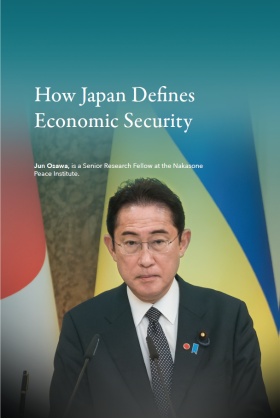How Japan Defines Economic Security


Excerpted from "Reshaping US-Japan Economic Security Partnership in the Indo-Pacific," Jun Osawa traces the development of Japan's economic security policy.
Japan’s post-war economic strategy had focused on growth and expansion into international markets. The rise of China as a security threat as well as an economic rival, however, has led the Japanese government to fundamentally reevaluate its approach to national security by implementing policies intended to shore up economic security. There was a sea change in 2014 under the Liberal Democratic Party, which then accelerated in 2017, and culminated in 2022 with the development and passage of the Economic Security Promotion Act together with a new National Security Strategy.
Japan’s initiatives focus on four key areas deemed vital for success in competing against China. The Japanese government is focusing on 1) securing the stable supply of critical commodities, 2) ensuring the safety of key infrastructure, 3) supporting the development of cutting-edge critical technologies, and 4) a secret patent system.
Although challenges remain, particularly Chinese threats in the cybersecurity realm, the United States and Japan are committed to enhancing their economic security.
Author


Indo-Pacific Program
The Indo-Pacific Program promotes policy debate and intellectual discussions on US interests in the Asia-Pacific as well as political, economic, security, and social issues relating to the world’s most populous and economically dynamic region. Read more

Explore More
Browse Insights & Analysis
360° View of How Southeast Asia Can Attract More FDI in Chips and AI


